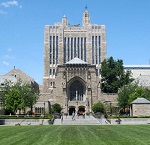
The first two programs within the innovative “Scholars as Leaders; Scholars as Learners” (SAL2) initiative, announced by Faculty of Arts and Sciences (FAS) Dean Tamar Gendler in February, are already underway, with participation from over fifty FAS faculty members thus far.
“I am absolutely delighted with the positive feedback we have received from FAS faculty regarding this inaugural year of SAL2 programming,” said Gendler. “The excitement among FAS faculty is a testament to the need for more opportunities for faculty to broaden their scholarly endeavors, which we hope will have long-lasting impacts on teaching and research. We are extremely grateful to the anonymous donor for allowing us to offer this suite of programs.”
Teaching Relief for Learning
During the 2018-19 academic year, six FAS faculty will enjoy a novel category of teaching relief – Teaching Relief for Learning – that allows faculty members to take one semester off from teaching to enroll in a non-credit fashion in undergraduate and graduate coursework at Yale. Philip Gorski, Professor of Sociology, will explore new techniques for the quantitative analysis of textual data, specifically in an effort to do cross-national research on the political rhetoric of contemporary populists. Shiri Goren, Senior Lector II and Director of the Modern Hebrew Program in the Department of Near Eastern Languages & Civilizations will pursue coursework in visual culture and the theoretical questions of cultural interpretation. Laura Wexler, Professor of American Studies and Women’s, Gender, and Sexuality Studies, plans to explore the computational tools and the pedagogical and ethical philosophies of the digital humanities. John Durham Peters, the María Rosa Menocal Professor of English and Film Studies, will take courses in the abstract languages of mathematics as well as Latin. In the spring, Katie Trumpener, Emily Sanford Professor of Comparative Literature and English, will spend the semester studying Yiddish, history of art, and history of drama, particularly opera. Finally, Professor of Anthropology Eduardo Fernández-Duque plans to learn the computer programming language R and explore data analysis during his semester of teaching relief.
“The wide variety of programs that are hosted under the umbrella of SAL2 reflect a clear vision for the professional development needs of all of FAS faculty. This is a wonderful example of how creative and thoughtful leadership can model inclusivity,” said Goren, who is participating in both programs currently being launched under SAL2.
Faculty Academy
The second program that will begin immediately following commencement is the 2018 Faculty Academy, which allows FAS faculty to take intensive mini-courses taught by fellow FAS faculty during the last two weeks of May. The four courses being offering this spring are: Teaching and Research with R Language for Statistical Computing and Graphics taught by Jay Emerson, Professor Adjunct of Statistics; Afrofabulation taught by Tavia Nyong’o, Professor of African American Studies, American Studies, and Theater Studies; The Hype and Reality of Artificial Intelligence taught by Computer Science Professor Brian Scasselatti; and Advanced Spanish Conversation taught by María M. Vázquez, Lector of Spanish.
“SAL2 is a unique program that allows faculty to identify areas where the FAS Dean’s Office can provide strategic resources to facilitate sharing their expertise with one another,” Divisional Dean of the Social Sciences Alan Gerber said in response to Emerson’s course on R language, which currently has twenty FAS faculty members enrolled. “We have an incredible faculty within the FAS, and now there are opportunities for them to learn from each other, even beyond the limits of departments and divisions.”
The anonymous gift in support of the SAL2 initiative will provide funding for five years of programming.